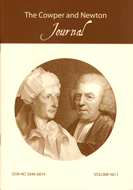Cowper and Conversation
‘To my taste, the most fruitful and most natural exercise of our minds is conversation’, said Montaigne (‘Le plus fructueux et naturel exercice de notre esprit, c’est à mon gré la conference’).1 Many an eighteenth-century writer would have agreed, including, I would hazard, Cowper. Soon after he met Lady Austen in July 1781 when he was writing ‘Charity’, the sixth of his set of ‘moral satires’, he praised her as ‘a lively agreeable Woman’, who ‘has seen much of the World and accounts it a great Simpleton as it is, she laughs and makes laugh, and keeps up a conversation without seeming to labor at it’.2 This brand of effortless wit may not have been entirely to the taste of John Newton, here Cowper’s correspondent. However, Newton would have been content enough to recognise the value of good serious conversation. Cowper attested in Adelphi, his conversion narrative, to the value

